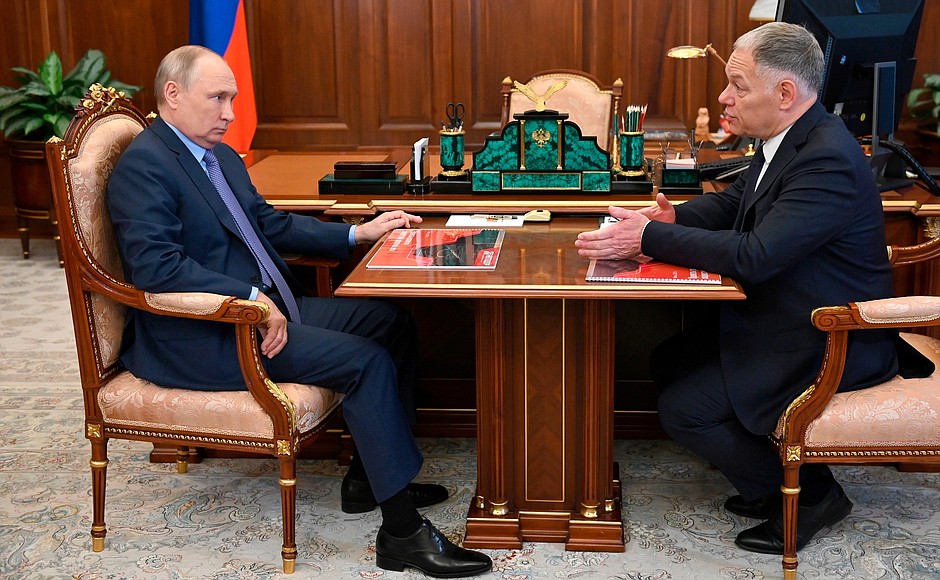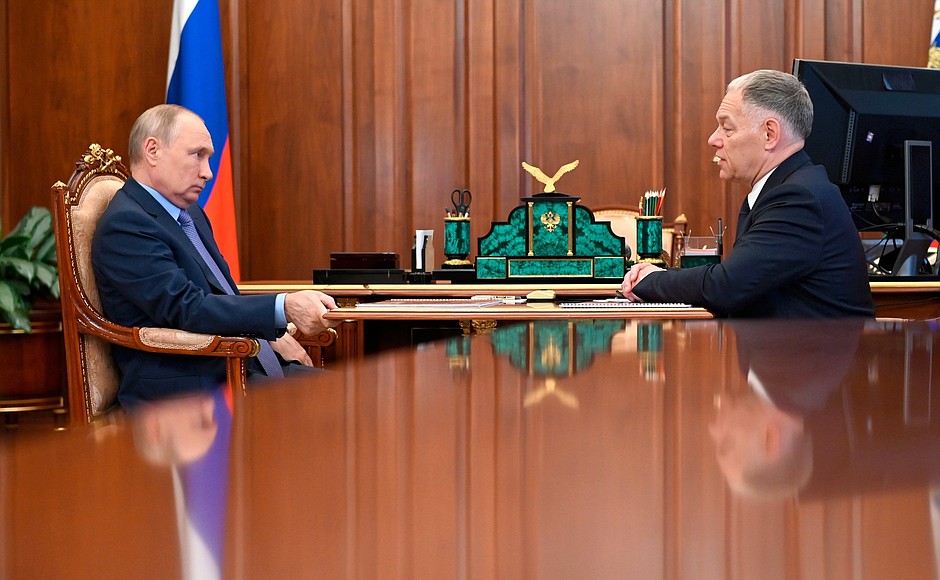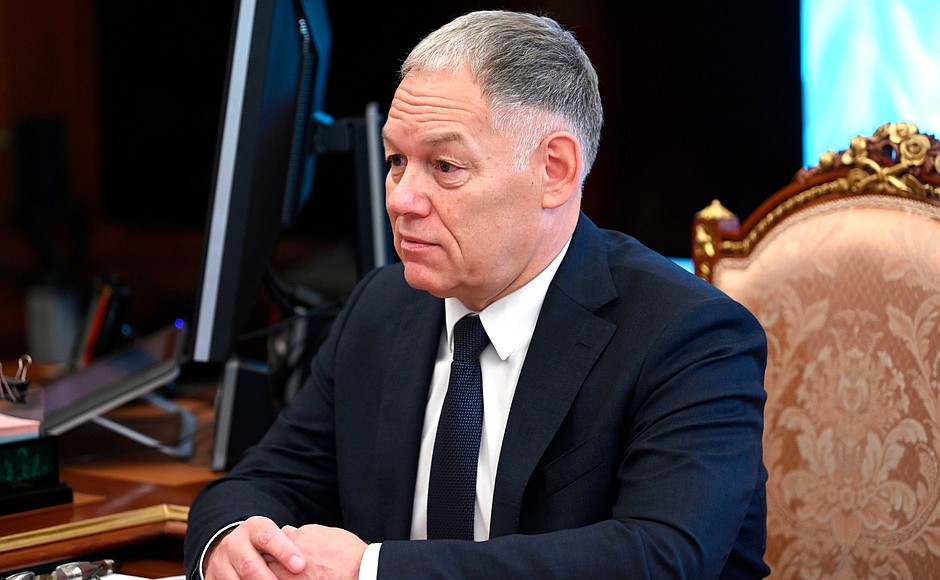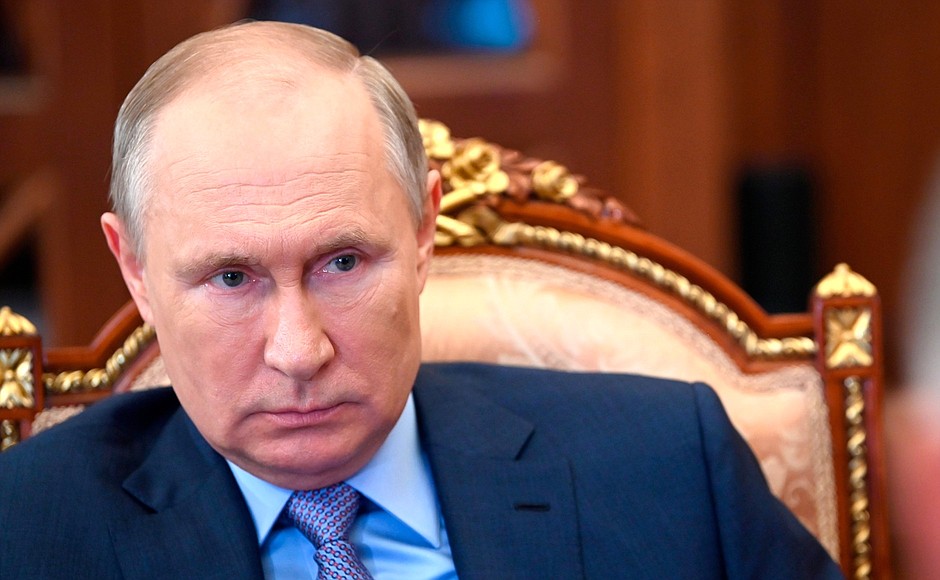President of Russia Vladimir Putin: Good afternoon.
Mr Petushenko, the company was established in 2009, and it has accomplished a lot since then. Today, the corporate contract portfolio exceeds one trillion rubles. To the best of my knowledge, private investment accounts for 25 percent of these resources.
State Company Management Board Chair Vyacheslav Petushenko: Yes, this is extra-budgetary funding.
Vladimir Putin: I would like to ask you to assess the situation in the road sector, to single out high-priority facilities and important short-term goals.
Vyacheslav Petushenko: Yes, indeed, we started with the Moscow-Krasnodar Motorway, and we have completed it. We resurfaced a 1,500-km section, and this is now a high-speed road.
Mr President, I believe that construction of the Moscow-St Petersburg Motorway is the main achievement and the first significant success not only for our company but also for the national road construction sector. We built this 606-plus-kilometre road, and it opened to traffic two years ago.
Today, there are no single-level intersections. We have to complete a short section bypassing Tver, and we are planning to do this by late 2023, no matter what. Consequently, the Russian Federation will receive the first route linking both capitals.
By the way, we have eliminated all the local bottlenecks, and current speeds are 130 kph. Present-day allowances considered, it is now possible to drive from Moscow to St Petersburg in just five hours.
The М-4 Motorway to Krasnodar, the Moscow-St Petersburg Road, and the Central Ring Road project, which we have finally completed, now allow us to create a North-South axis from St Petersburg to the Black Sea, given that our colleagues are to build a motorway from Krasnodar to the Kerch Bridge.
I think that by 2024 we will be able to drive from St Petersburg to Sevastopol without stopping at a single traffic light and without having any single-level intersections. Currently, we are working hard on the construction of bypasses around Rostov and Krasnodar and then we will drive the 2,500 kilometres [from St Petersburg to Sevastopol] without a hitch.
The Central Ring Road is a meaningful project, Mr President. Like any other project carried out now, it is live and requires development and we can see that we have to remove some bottlenecks there.
And the main thing that we are working on now, Mr President: when we commissioned the М-11 Motorway, we said that we would begin the М-12 Motorway, Moscow – Nizhny Novgorod – Kazan. The start was signalled last July; 800 kilometres.
At present, we are practically working on each kilometre. We have started building 75 engineering structures and we keep on working. There are three very large projects there: bridges across the Volga, the Oka and the Sura. And the pace that we have reached now and the financial support mean that we can be sure of completing the work and that we will be off in 2024.
Vladimir Putin: How is your situation with labour resources?
Vyacheslav Petushenko: This is one of the most complex issues to date. We understand that we need up to 20,000 people. One of the sections is being built by our colleagues from China; however, the labour force issue is a difficult one.
Our work requires high skills, the machinery is very complex. Although formerly we needed unskilled workers, we hardly need them now, so the labour force problem still exists. However, major enterprises, the most powerful ones in our sector, which have the engineering and technical personnel, are working with us. As for the workers, I think we will be able to solve all the current problems.
Vladimir Putin: You know, in the construction sector – including road construction – we make decisions related to debureaucratisation in a broad sense, that is, excessive regulation and the outdated statutory framework.
How do you assess the situation from this point of view?
Vyacheslav Petushenko: I recalled this when the Central Ring Road was launched – I also built and opened the ring road around St Petersburg ten years ago – and I compared these two cases from the point of view of decision making.
I can say, Mr President, that in the past two years a lot has been done. The importance of major projects such the Central Ring Road or the Moscow-Nizhny Novgorod-Kazan Motorway shows that we will not achieve anything if we do not speed up the process.
The current “regulatory guillotine” helps to debureaucratise many issues because the launch of road construction is a difficult period and requires a boost in the beginning.
Vladimir Putin: You said that a lot has been done. Is it enough?
Vyacheslav Petushenko: No, I do not think it is quite enough; there is still much left to do.
Vladimir Putin: Exactly, please work on it. The bureaucratic part of the system, the statutory framework even within the company, needs to be addressed carefully. Of course, the cost is one of the most crucial issues.
Vyacheslav Petushenko: Yes, I agree.
Vladimir Putin: We are witnessing inflation processes. Global inflation is on the rise, and construction has gotten more expensive all over the world. Naturally, it affects us too, but we still need to do everything in our power to minimise these costs and prevent an unreasonable increase.
Do you feel the Government and the Federal Anti-Monopoly Service paying attention to your work?
Vyacheslav Petushenko: I can say that in the past few years… You know, we are even breaking some older stereotypes when we sometimes did not even bother to think why we were making such decisions. But new equipment and new approaches… Most importantly, we have to build more per every ruble invested, to put it bluntly. We have to use as many of our resources as possible in order to streamline various decisions.
Regarding the Moscow-Nizhny Novgorod-Kazan route, we eliminated very many excessive engineering solutions that had existed in the past. We reduced the height of motorway embankments that was calculated in line with projected snowfall levels of the 1930s. Today, we operate magnificent snow removal equipment, we have reduced the volumes and cost of works, and we have removed many engineering structures, which allows us to accomplish more, while spending less.
We can see that the Government is also actively involved in this process because we have established working groups with Glavgosekspertiza [Main Directorate of State Examination]. We discuss engineering solutions with industry experts, and it is, indeed, necessary to eliminate existing stereotypes. Mr President, the construction sector community is ready for this, and we can see that we implement very many engineering solutions being suggested to us by builders and designers.
Vladimir Putin: And, of course, it is also necessary to work with subcontractors.
Vyacheslav Petushenko: It is. We do not have very many major enterprises among our subcontractors, and they are our flagships.
Of course, second- and third-level subcontractors are doing a lot. As a rule, they have a narrow field of responsibility. Our large enterprises are multipurpose companies, and enterprises with a narrow specialisation are usually small. When they get involved, they offer solutions facilitating our work.
Vladimir Putin: Good.
<…>



